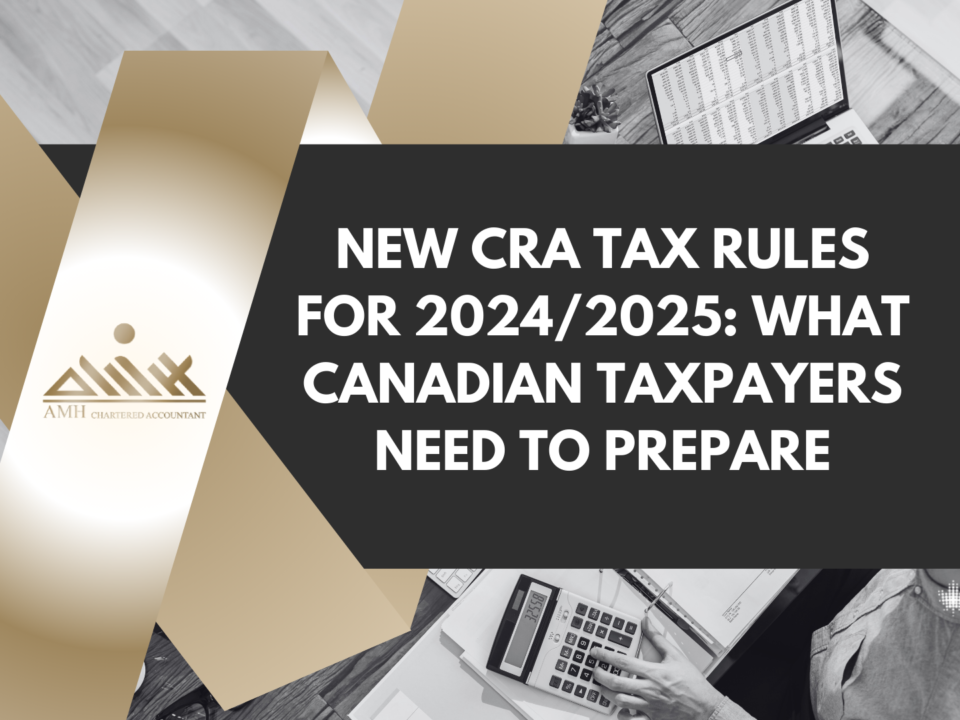
What Should Be Included in Your Year-End Financial Statements?
August 15, 2025
How to Track and Analyze Overhead Costs Effectively
August 25, 2025Annual Tax Planning Tips to Reduce Your Corporate Tax Bill
Corporate tax planning is one of the most effective ways to manage your business’s finances, maximize profits, and reduce your tax liability. By strategically managing your tax affairs, you can lower your corporate tax bill and improve cash flow. At AMH Chartered Professional Accountant, we assist businesses in Toronto, Milton, Oakville, Hamilton, Kitchener, and Waterloo with annual tax planning to ensure tax efficiency and compliance.
Introduction: The Importance of Annual Tax Planning for Corporations
Tax planning is an essential part of running any business. While paying taxes is a legal obligation, businesses can take proactive steps to minimize their tax burdens through effective tax planning. Corporations, in particular, benefit greatly from tax planning, as there are various strategies available to reduce tax liability and optimize financial outcomes.
Annual tax planning involves reviewing your company’s financial situation, understanding your potential tax obligations, and identifying strategies to reduce your overall tax bill. This process should not be left until the last minute but should be part of a year-round strategy to ensure that you are making the most of the tax-saving opportunities available to you.
In this article, we will provide practical tax planning tips that can help corporations reduce their tax bills while remaining compliant with Canadian tax laws. From taking advantage of deductions to structuring your business in a tax-efficient manner, these tips will set your business on the path to tax savings.
Why Corporate Tax Planning is Essential
Effective corporate tax planning is crucial for several reasons:
Minimizing Tax Liability: With the right tax strategy, you can significantly reduce the amount of taxes your business has to pay, freeing up resources to reinvest in your operations.
Improving Cash Flow: Tax savings can improve your business’s cash flow, providing more money to reinvest or pay down debt.
Ensuring Compliance: By planning ahead, you can avoid penalties for underpayment or late filing, ensuring that your business stays in compliance with tax regulations.
Enhancing Business Value: Proper tax planning improves profitability and financial health, which can make your business more attractive to investors and potential buyers.
With so many potential tax-saving strategies available, it’s important to work with tax experts who can guide you through the process and ensure that your business is taking full advantage of these opportunities.
Key Tax Planning Strategies for Corporations
There are numerous strategies that corporations can employ to reduce their tax bill. Below are some of the most effective methods for minimizing corporate taxes:
1. Take Advantage of Available Tax Deductions
One of the most straightforward ways to reduce your corporate tax liability is by claiming tax deductions. Tax deductions reduce your taxable income, thereby lowering the amount of taxes owed.
Common corporate tax deductions include:
Business Expenses: Ensure that all legitimate business expenses, such as salaries, rent, utilities, and office supplies, are deducted.
Interest Expenses: Interest paid on business loans is tax-deductible.
Bad Debts: If you are unable to collect on certain accounts receivable, you can write them off as bad debts.
Employee Benefits: Offering employee benefits like health insurance or retirement plans may provide tax deductions.
Be sure to track and document all eligible expenses to maximize your deductions.
2. Maximize Your Tax Credits
In addition to deductions, businesses can take advantage of tax credits to reduce their tax bill. Tax credits directly reduce the amount of taxes owed, providing a more significant impact than deductions.
Some common tax credits available to corporations in Canada include:
Scientific Research and Experimental Development (SR&ED) Tax Credit: This federal program offers tax incentives for businesses involved in research and development activities.
Small Business Deduction: Small businesses may qualify for a reduced tax rate on their first $500,000 of active business income.
Investment Tax Credit: For businesses making investments in specific capital assets.
Make sure to research and apply for any tax credits your business qualifies for, as these can significantly reduce your tax liability.
3. Consider Tax Deferral Strategies
Tax deferral allows businesses to delay paying taxes to a future year. While this doesn’t reduce your overall tax liability, it can provide immediate cash flow benefits by allowing your business to hold onto money for longer periods.
Common tax deferral strategies include:
Deferring Income: If your business has significant income in a given year, consider deferring some income to the following year, if possible, to avoid a higher tax bracket.
Pension Plan Contributions: Contributing to a corporate pension plan can allow your business to defer taxes until employees retire and begin withdrawing funds.
Deferring taxes can be an effective strategy for businesses looking to improve cash flow and reinvest in operations.
4. Optimize Your Capital Structure
Your company’s capital structure—how it finances its operations—can impact your tax bill. By strategically managing your capital structure, you can reduce your overall tax liability.
Debt vs. Equity: Interest payments on debt are tax-deductible, so structuring your business to have more debt relative to equity can provide tax benefits. However, too much debt can also pose a risk, so balance is key.
Dividends vs. Salaries: If your business is incorporated, you can choose to pay yourself through dividends or salary. Dividends are taxed at a lower rate than salary income, but paying yourself through salary provides the advantage of contributing to the Canada Pension Plan (CPP) and earning RRSP contribution room.
Carefully consider your capital structure and seek advice from a tax professional to determine the best approach.
5. Use Income Splitting to Lower Tax Liability
Income splitting involves distributing income among family members or related parties in order to reduce the overall family tax liability. In Canada, income splitting is commonly used in family-owned businesses.
Dividends to Family Members: You can pay dividends to your spouse or children who are shareholders in the business, thus shifting income to family members in lower tax brackets.
Family Trusts: A family trust can be used to allocate income to beneficiaries in lower tax brackets, further reducing your overall tax burden.
Income splitting can be an effective way to lower taxes, but it’s important to comply with CRA rules to avoid tax penalties.
6. Plan for Small Business Deduction (SBD)
In Canada, small businesses can qualify for the Small Business Deduction (SBD), which provides a reduced corporate tax rate on the first $500,000 of active business income. To qualify for the SBD, your business must meet specific criteria, including being a Canadian-controlled private corporation (CCPC).
If your business is eligible, take full advantage of the SBD to lower your effective tax rate. However, be aware of the grind rate, which reduces the SBD as your business income exceeds $500,000.
7. Utilize Corporate Losses for Future Tax Relief
If your corporation has incurred losses in previous years, you can carry those losses forward to offset taxable income in future years. This is known as a loss carryforward. Alternatively, you can carry back losses to offset income from prior years and receive a refund on taxes paid.
Loss carryforwards are an important tool for managing tax liabilities during challenging years and ensuring that your business is not overtaxed in future profitable years.
8. Review Your Depreciation Strategy
The depreciation of business assets—such as buildings, machinery, and equipment—provides tax deductions over time. By reviewing and optimizing your capital cost allowance (CCA) claims, you can maximize the depreciation deductions for your business.
Accelerated Depreciation: In certain cases, you may be able to claim accelerated depreciation for assets that lose value quickly.
Classifying Assets: Ensure that your assets are classified correctly according to CRA rules to take advantage of the appropriate depreciation rates.
Maximizing depreciation can reduce taxable income and improve cash flow.
9. Reassess Your Compensation Strategy
The way you compensate yourself and your employees can also have a significant impact on your corporate tax bill. Consider:
Salary vs. Dividends: Determine the most tax-efficient way to compensate yourself and key employees. As mentioned earlier, dividends are taxed at a lower rate than salary.
Bonuses and Benefits: Bonuses and employee benefits can also be deducted as business expenses, but they must be structured carefully to ensure tax efficiency.
Working with a tax professional will help ensure that your compensation strategy aligns with both your personal financial goals and your business’s long-term tax planning objectives.
Common Mistakes in Corporate Tax Planning and How to Avoid Them
Failing to Keep Up with Tax Law Changes: Tax laws are subject to change. Stay informed about the latest updates to ensure that your tax strategy remains effective.
Neglecting to Claim All Deductions: Many businesses overlook eligible tax deductions. Ensure that all valid expenses are claimed to maximize your tax savings.
Not Consulting with a Tax Professional: Corporate tax planning is complex. Working with a qualified accountant or tax professional ensures you are using the best strategies to minimize your tax bill.
The Role of Accounting Software in Tax Planning
Using accounting software such as QuickBooks, Xero, or Sage can help you track and manage your finances more effectively, making tax planning easier. These tools can help you generate accurate financial reports, track deductible expenses, and monitor tax liability throughout the year, making year-end tax planning more efficient.
How AMH Chartered Professional Accountant Can Help
At AMH Chartered Professional Accountant, we specialize in providing businesses with expert tax planning advice to reduce corporate tax liability. Our services include:
Tax Strategy Consultation: We develop tax-saving strategies tailored to your business.
Financial Reporting and Forecasting: We help you generate accurate financial reports and projections to plan for future taxes.
Year-Round Tax Planning: We assist you with ongoing tax planning, ensuring that you’re always prepared for tax season.
The Impact of Tax Law Changes on Corporate Tax Planning
Stay informed about any changes in tax laws that could affect your business. With tax laws constantly evolving, it’s essential to work with a professional who can guide you through these changes and help you adjust your tax strategy accordingly.
Conclusion: Effective Tax Planning for Long-Term Savings
Managing corporate taxes is an ongoing process that requires careful planning and attention. By implementing the strategies outlined in this article, your business can significantly reduce its tax bill, improve cash flow, and maintain financial health.
At AMH Chartered Professional Accountant, we provide expert tax planning services to help businesses navigate the complexities of tax laws and minimize their corporate tax liabilities. With our guidance, you can achieve long-term tax savings and financial success.
FAQs
What is the Small Business Deduction (SBD)?
The Small Business Deduction provides a reduced corporate tax rate on the first $500,000 of active business income for eligible Canadian-controlled private corporations (CCPCs).
How can I reduce my corporate tax bill?
By utilizing tax deductions, credits, deferral strategies, and effective debt management, businesses can significantly reduce their tax liabilities.
Can AMH help me with tax planning?
Yes, AMH Chartered Professional Accountant offers comprehensive tax planning services to help reduce corporate taxes and ensure compliance with Canadian tax laws.
Is it important to review my tax strategy yearly?
Yes, regular tax strategy reviews ensure that your business is taking advantage of all available opportunities to minimize taxes, especially as tax laws and business conditions change.
What are the benefits of using accounting software for tax planning?
Accounting software helps track expenses, monitor cash flow, generate accurate financial reports, and streamline tax planning, making the process more efficient and accurate.




